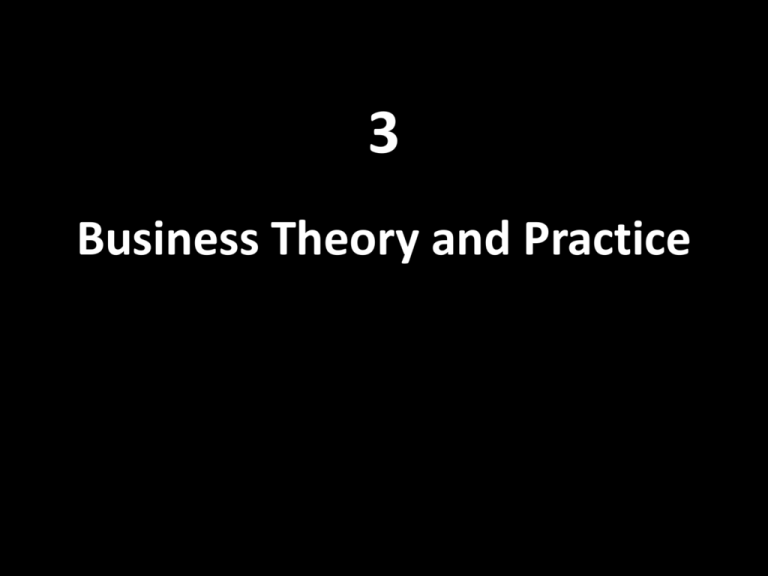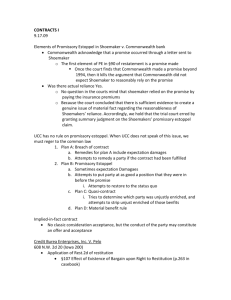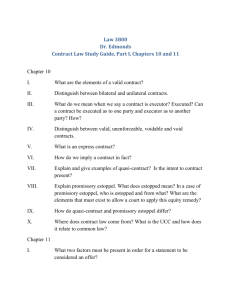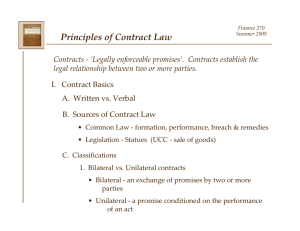
3
Business Theory and Practice
© Oxford University Press, 2007. All rights reserved.
Business Theory
Dominant theories underlying contract law:
(1) Market and bargaining theory
• predominant in 19th century/early 20th century
• promotes freedom of contract (partner freedom and
term freedom) and
• sanctity of contract (parties should be held to their
bargains)
• these principles of freedom and sanctity of contract
reinforced the purpose of contract law to provide
certainty.
Business Theory cont…
(2) Consumer Protection
After WW2 consumer protectionism became more
common
Why ? The decline of laissez faire , increasing monopolies ,
corporatisation and standard form contracts.
• Characteristics of this theory : flexibility, equity,
avoidance of unjust enrichment and justice
• examples include the doctrines of equitable estoppel and
unconscionability
• Policy rationale : Intervention to promote consumer
interests and principles of fairness and reasonableness in
contract.
• more discretionary remedies and less predictable in
outcome.
Business Practice
Basic issue : How relevant is contract law to daily commercial practice?
•
The nature of empirical studies
There are a number of different approaches to the theories of contract law
e.g. economic analysis, feminist approach , relational approach.
We focus on the theories of Professors Stewart Macauley, Hugh Beale and Tony
Dugdale.
Studies show : how contract law operates in society and how it is viewed by
participants in the legal system.
•
Predominant view:
– The Relational approach - Professor Macaulay
Macauley study :
•
study of inter-firm contacting in Wisconsin, published in 1963: 48 companies
and 6 law firms
•
contract involves two elements:
1) Rational planning of the transaction
2) Sanctions ensure performance or compensate for no performance of
contract.
Business Practice cont ...
Macaulay - re planning:
• Provides the framework within which parties conduct
their business relationships.
• business people may plan for primary obligations (such
as actual performance) and time and manner of
payment, but rarely for what will happen if things go
wrong
• long-term business relationships involve friendship,
reputation, interdependence, morality and altruistic
desires
• relational contracts are dynamic and change over time.
Business Practice cont ...
Macaulay - re sanctions:
The law creates the background for the way parties
settle their contractual disputes.
e.g a “strong case” means a parties negotiating
position and their outcome are strengthened.
Also the threat of lititgation ( going to Court)
• extra-legal sanctions and pressures (‘relational’
sanctions) – in particular the need to maintain the
firm’s reputation- more important than threat of legal
action in inducing performance
• litigation a last resort; implied breakdown of the
business relationship.
Business Practice cont ...
Beale and Dugdale’s parallel study (Bristol, 1975) of 19
firms of engineering manufacturers:
• Confirmed the basic situation outlined by Macaulay
but also mentioned the role of trade customs and
unwritten norms , trust and personal contact.
• Theory agrees with Macaulay’s basic picture but also
updated it in a number of respects. Their research
highlighted role of trade customs, trust and personal
contact.
Business Practice cont ...
Beale and Dugdale found:
(i) relatively minimal amount of contractual planning:
planning expensive and risk of loss may be small
(ii) contract remedies are also rarely used, due to
expense, delays and uncertainty of legal proceedings
(iii) apart from primary obligations, parties relied on
trade custom or a ‘gentleman’s agreement’ with
other party to deal with adjustment or enforcement
of obligations.
Business Practice cont ...
Deakin et al study (1993-1994) of mining equipment
and kitchen furniture manufacturers in Britain,
Germany and Italy (62 firms interviewed)
• highlights the impact on contractual relations of the
overall contractual environment
• found significant variations between countries as
well as between sectors.
Business Practice cont ...
Deakin et al:
• contractual practices in Britain kitchen furniture
sector confirm the earlier empirical studies:
attitude of give-and-take, reliance on business
reputation and personal dealings
• position in mining equipment different: more
emphasis on formal relations. Confirms Beale and
Dugdale, since such contracts have high level of
complexity and thus more risk involved.
• The outcome of the study suggests that a formal
legal contract is compatible with trust between
the parties and does not harm fostering a good
relationship between the parties
Business Practice cont ...
If contract law stands at the margins of important long
term continuing business relationships, as the
empirical studies suggest:
• why study contract law?
– Underpins economy and financial system and impacts
distribution of wealth of society (relevant to business)
– Establishes the framework or background that parties
conduct their business
• what is the role of contract law?
See Notes below
Definition of a Legal Contract
A legal contract is an agreement between
two or more parties in which legal rights
and obligations are created, and are
enforced by a court.
Or put another way :
An agreement between two or more
parties that is enforceable in a court of
law.
Elements of a Valid Legal Contract
• For a contract to be legally enforceable the contract
must contain the following elements:
(1) AN OFFER
(2) ACCEPTANCE OF THE OFFER
(3) CONSIDERATION
(4) INTENTION TO CREATE LEGAL RELATIONS
(5) CERTAINTY OF TERMS
(6) CAPACITY TO CONTRACT
• All of these elements must be present before there is a
valid and legally enforceable contract.
The Elements of a Valid Contract cont…
OFFER
CAPACITY
CONSIDERATION
THE CONTRACT
ACCEPTANCE
CERTAINTY
INTENTION
Elements of a Contract:
1) Offer
What is an offer?
– Does not have to be in writing
– Promissory: Promise to do something or to refrain from
doing a certain act
– Intention: To be legally binding
– Communication: To the Promisee
– Certainty: Terms must be clear & certain
– Finality: Must be a degree of finality with the terms
Elements of a Contract:
1) Offer cont…
Objective Test: For the Court to determine whether a statement made
by one party is an offer or not the Court uses an “objective test” to see
whether a statement is an offer or not.
• Reasonable person test : The court asks the questionWhether a reasonable person standing in the position of
the recipient would believe the statement was a promise
in the form of an offer?
• Standard applied by courts
• Contract Law v Criminal Law
• Contract law applies an objective test to determine
liability
• Criminal law applies subjective test to determine guilt
Elements of a Contract:
1) Offer cont…
Offers v. Invitations to Treat
•
•
•
•
•
•
Shop Displays – generally an invitation to treat.
Advertisements- generally invitation to treat
Catalogues
Sales Puffery
Vending Machines
Delicatessens
Elements of a Contract:
1) Offer cont…
An offer must be made to another person
• Offeror: party that makes the offer
• Offeree: party that receives the offer
Offer made to the whole world
Carlill v Carbolic Smoke Ball Company ( page 49)
See notes below
Elements of a Contract:
1) Offer cont…
An Offer must be communicated
The general rule is that the party who recieves the offer
(the offeree) must communicate the acceptance back to
the offeror)
• Offeror to Offeree
• Mode of Communication
• Verbal/ Writing/Post
• Contemplation of the Parties
See notes below
Elements of a Contract:
1) Offer cont…
Termination of an offer
An offer can be terminated through the following ways:
(1) Revocation
(2) Lapse
(3) Rejection By Offeree
(4) Implied rejection : counter offer
Eg - A offers to sell his car to B for $1000. B says to A, “I will
give you $750". B statement amounts to a counter offer which
terminates the original offer by A
Do you have a valid offer?
Invitation To Treat
Do you have valid
offer?
Yes
No
Offer
Preliminary
Inquiries
Supply of
Information
Elements of a Contract:
2) Acceptance
• An acceptance is a final and unqualified assent to all
the terms of the offer.
• General rule : The party who receives the offer (the
offeree) must communicate the acceptance back to
the offeror)
Rules of acceptance :
(1) Offer still in force
(2) Offer to made by the offeree
(3) Unqualified an absolute
(4) Acceptance can be in writing, oral or by conduct
(5) Silence does not constitute an acceptance
(5) Communication
Elements of a Contract:
2) Acceptance cont…
• Communication of acceptance
• Completed acceptance
• Reasonable time
Elements of a Contract:
2) Acceptance cont…
• Postal acceptance rule
The postal acceptance rule : A special rule has been made by
the Courts that where post Is the preferred method of
acceptance then acceptance occurs at the time the letter is
posted and not when the letter is delivered. ( acceptance is
deemed to have occurred at the time the letter is posted.)
Limitations to the rule
•
•
•
•
letters and telegrams
instantaneous methods of communication
addressed and stamped
actual communication contemplated
Do you have a Valid Acceptance?
Acceptance
Must Match the
Terms of the Offer
Communication
Exceptions
Postal Acceptance
Unilateral
Contracts
Elements of a Contract:
3) Consideration
•
Applies to all contracts other than contracts made under seal/
deed.
Contracts made under deed form do not require
consideration.
–
o
Every contract whether written or oral requires some form of
consideration before the contract can be legally enforceable.
Example : money
Other examples :
o
A promise to do something
o
A promise not to do something
o
An act or performance of an obligation
Definition
Consideration is an essential element in every simple contract. The
doctrine of consideration requires that:
(1) there must be an exchange between the parties, involving either a promise
for promise, or promise for performance; and
(2) the promise or performance given in exchange must have value.
Elements of a Contract:
3) Consideration cont…
•
Rules of Consideration
•
Consideration does not have to be adequate
–
The law is not concerned about whether the consideration is
adequate or equally beneficial just that something of value is
exchanged between the parties
•
Consideration must be sufficient
•
•
Consideration must not be illegal i.e. cant be an unlawful act
Consideration must move from the promisee
For consideration to be valid and enforce a promise, it must move
from the party who receives the promise.
Past consideration is not good consideration
Only new consideration is valid so an existing contractual
obligation is past consideration
•
Rules of Consideration
Consideration
Involves a mutual
exchange
Cannot be illegal
Must not be past
Must not be
ilusory
Elements of a Contract:
3) Consideration cont…
Renegotiating Debts
• Performing existing contractual obligations does not amount to good
consideration to enforce a promise : Foakes v Beer
Example (1) : A owes B $100. A decides to pay B $90 in full satisfaction of the
debt. B then sues A for the balance ($10). B will succeed because there is no
consideration for his promise to accept $90 for full payment : Foakes v Beer
Example (2) : A owes B $100. A decides to pay B $90 earlier for full payment.
B will not succeed for the further $10 because A has done something extra, he
has paid earlier : Pinnels case.
Elements of a Contract:
3) Consideration cont…
• Promissory Estoppel
The strict application of the doctrine of consideration is
modified with the doctrine of promissory estoppel. The doctrine
of estoppel operates to enforce certain promises which have not
been supported by valuable consideration.
Elements of the doctrine of estoppel:
– There must be a promise by the promisor to the promisee
– The promisee must have relied on the promise
– The promisee will suffer detriment if the promisor is allowed to go back
on his promise
– It would be unconscionable (unfair) to allow the promisor to break his
promise
Elements of Promissory Estoppel
Promissory
Estoppel
Promise/
Representation/
Assumption
Reliance
Material Detriment
Unconscionability
Promissory Estoppel cont…
Walton Stores v Maher
• Walton’s case was seen as important in the development of the doctrine,
because it extended the operation of the doctrine to create a new right of
action.
• Promissory estoppel only operates when all the above elements have been
satisfied. Promissory estoppel has its origins in the High Trees Case. The
doctrine has been extended in the High Courts decision in Walton Stores.
• The principle of promissory estoppel only applies when it would be
inequitable/unconscionable (unfair) to allow the promisor to go back on his
promise.
Promissory Estoppel cont…
Example:
• A enters into a lease agreement with B. The lease
provides that A pays B $500 weekly rent. A then falls
into financial difficulty and asks B if he could reduce
the rent for 12 months to $300. B agrees. A relies
on B’s promise to accept $300 rent, and pays him
that amount. 12 months later B sues A for the
difference in rent ($200 week).
• Advise A.
Elements of a Contract:
4) Intention to Create Legal Relations
• Commercial agreements
For a contract to be legally enforceable there must be an
intention by the parties to be legally bound. In Commercial and
Business Agreements there is a presumption that the parties
intend to create legal relations: Edwards v Skyways.
Exclusions:
1) Express
This presumption can be rebutted but the onus is on the party seeking to exclude legal relations.
An express exclusion of intention by the parties will be given effect by the courts.
2) Social & Domestic Agreements.
There is a presumption that social and domestic agreements are not intended to create legal
relations. However this can be rebutted by evidence to the contrary.
Elements of a Contract:
4) Intention to Create Legal Relations cont…
• Husband & Wife Agreements
The courts consider domestic arrangements between
husband and wife to be social agreements and not legally
enforceable: Balfour v Balfour.
Exceptions:
If the agreement between husband and wife involves
essentially a commercial matter then the agreement will be
enforceable : Milliner v Milliner.
Do you have an intention to create legal
relations?
Yes
Do the parties have
an intention to create
legal relations?
No
Check to see whether
the intention has been
expressly excluded
Check if the
commercial
presumption applies
If intention has not
been excluded check
for other elements
If the commercial
presumption applies
check for other
elements
Check if the social/
domestic
presumption applies
Elements of a Contract:
5) Certainty of Terms
• As a general rule the courts will not enforce vague or
incomplete agreements.
• However the courts will strive to fund a valid contract. If
terms are uncertain, the courts may clear the
uncertainty by the ff means:
- Trade customs & Usage
- Previous dealings between the parties to determine the
essential terms of the agreement.
Elements of a Contract:
6) Capacity to Contract
• The capacity of certain persons to enter into legal
contracts may be affected.
• Especially minors, drunkards and bankrupts.
6) Capacity to Contract – Minors
Minors
• Minors are any persons below the age of 18.
• Contracts with minors fall within three categories:
- Valid
- Voidable; and
- Void
• Valid Contracts - 2 types: Contracts for Necessaries
and Contracts for Beneficial Service.
6) Capacity to Contract
– Minors cont…
Contract for Necessaries
• Necessaries are defined as goods suitable to the condition in life of such a
minor and to his actual requirements at the time of such sale and delivery.
Two important questions arise:
(1) Can the goods/services be classed as necessaries for a person in the
circumstances of the minor in question?
(2) Were the goods/services in fact necessary to the minor at the time?
• If the answer is yes to both these questions then there will be a valid contract
and the minor will have to pay.
• Examples of goods/services which are necessaries include: food, housing,
education, medical and legal expenses.
6) Capacity to Contract
– Minors cont…
Contracts for beneficial services
• The key question here is to ask:
Does the contract of service provide a benefit to the minor?:
Hamilton v Lethbridge.
• If the answer is yes, then the contract for beneficial services
will be a contract for necessaries and the minor will have
sufficient capacity to form a valid contract.
6) Capacity to Contract
– Minors cont…
Voidable Contracts
• These are contracts which can be avoided by the minor before
he/she turns 18 or within a reasonable time after he/she
turns 18.
• They apply to contracts which are of a permanent
nature/continuing obligation.
Eg: shares, leases and
partnerships.
• With voidable contracts the minor can free himself from
future obligations, but will have to pay for benefits already
received.
6) Capacity to Contract
– Minors cont…
Void Contracts
• Contracts other than for necessaries or beneficial contract of
service are void against the minor.
• Contracts involving loan repayments are also void against the
minor.







